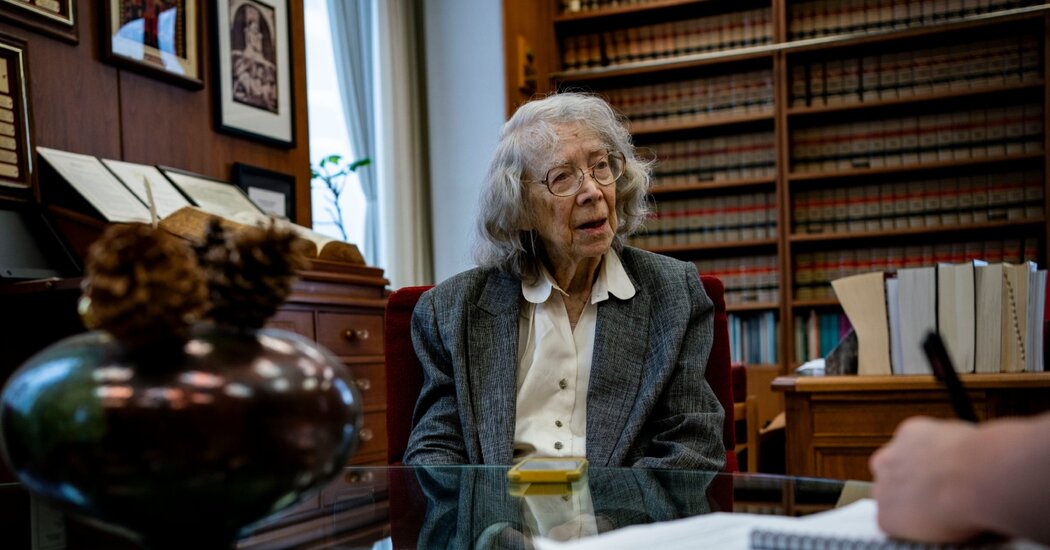Judge Pauline Newman’s colleagues on a federal appeals court in Washington have called her “the heroine of the patent system” and “the most beloved colleague on our court.” But on Wednesday, they also told Judge Newman, 96, that she had been suspended amid growing concerns about her mental fitness.
The order suspending Judge Newman for one year followed an unusually bitter and public dispute over her cognitive state and her ability to continue to serve on the United States Court of Appeals for the Federal Circuit, a specialized court that hears patent cases.
Judge Newman, who was appointed by President Ronald Reagan in 1984, has vigorously challenged her colleagues’ investigation into her fitness and has said she is mentally able to do her job. Earlier this year, she filed a federal lawsuit accusing the chief judge of the court, Kimberly A. Moore, and other colleagues of violating her due process rights.
In the unanimous order, which was issued by the court’s active judges, Judge Newman’s colleagues wrote that they had no choice but to suspend her, despite her status as “a highly valued and respected colleague,” widely recognized for her contributions to the court and knowledge of the patent system.
More than 20 interviews with members of the court staff, along with emails sent by Judge Newman, “provided overwhelming evidence,” the order said, that she “may be experiencing significant mental problems including memory loss, lack of comprehension, confusion and an inability to perform basic tasks that she previously was able to perform with ease.”
The order said that evidence pointed to instances in which Judge Newman, when struggling with basic tasks, “became frustrated, agitated, belligerent and hostile.”
“With no rational reason — other than frustration over her own confusion — Judge Newman has threatened to have staff arrested, forcibly removed from the building and fired,” the order said. “She accused staff of trickery, deceit, acting as her adversary, stealing her computer, stealing her files and depriving her of secretarial support.”
Her refusal to comply with a special committee’s order that she be examined by a neurologist and undergo neuropsychological tests “constitutes serious misconduct,” the order said. It said she could be suspended again in one year if she continued to refuse to undergo the required tests.
“We are acutely aware that this is not a fitting capstone to Judge Newman’s exemplary and storied career,” the order said. “We all would prefer a different outcome for our friend and colleague.” Gregory Dolin, Judge Newman’s lead lawyer, said on Wednesday that he planned to ask a panel of judges from around the country to review the order, which he called “flatly illegal.”
He said Judge Newman was never given an opportunity to question court staff members who had made accusations about her mental fitness. He also said it was inappropriate for her colleagues, who have personal knowledge of the claims against her, to judge her fitness for office.
“She obviously believes she’s perfectly competent, and her physicians have confirmed that,” Mr. Dolin said.
It is not uncommon for federal judges, who have life tenure, to serve into their later years. Judge Wesley E. Brown, who died in 2012, regularly presided over cases well past his 104th birthday, with a tube under his nose feeding him oxygen during hearings.
Judge Newman’s suspension seemed bound to reignite the debate over mandatory retirement ages and term limits for federal judges. A 2020 study in The Ohio State Law Journal found that the average age of federal judges was 69, older than it had been at any other time in the country’s history.
Arthur D. Hellman, a professor emeritus at the University of Pittsburgh School of Law, said the suspension was a “fascinating but also sad development.” He said it was “extremely unusual that this whole proceeding has been carried out in public view.”
“Almost always in the past, when something like this has happened, it has been handled behind closed doors, without a formal proceeding and certainly without the public scrutiny we’ve had with this proceeding,” Professor Hellman said, noting instances in which the spouses or children of federal judges had nudged them toward retirement.
The order said that Judge Newman’s colleagues had tried to handle concerns about her fitness internally but that she had refused to speak to them or quickly ended their attempts to discuss the issue. Judge Moore had shared a draft complaint with Judge Newman detailing some of the concerns and tried to meet with her, the order said. But Judge Newman refused repeated requests for a meeting, it said.
Interactions with Judge Newman had become “so dysfunctional,” the order said, that the clerk of the court had advised staff members to avoid interacting with her in person or to bring a co-worker with them.
Mr. Dolin said that Judge Newman had submitted to the court reports from two doctors she chose — a neurologist and a forensic psychiatrist — who “concluded she suffers from no mental or cognitive disability that would render her unable to perform the functions of her office.”
Judge Newman also provided an analysis that found she was writing opinions as quickly this year as she was in 2018, before anyone formally complained about her mental fitness, Mr. Dolin said.
Judge Newman has no plans to retire, Mr. Dolin said, but would step down if her doctors believed it were necessary.
“She’s not holding on to this because she’s got nothing better going on in her life,” Mr. Dolin said. “She is doing this job because she believes in this job, and she believes she has something to contribute.”



Now do politicians.